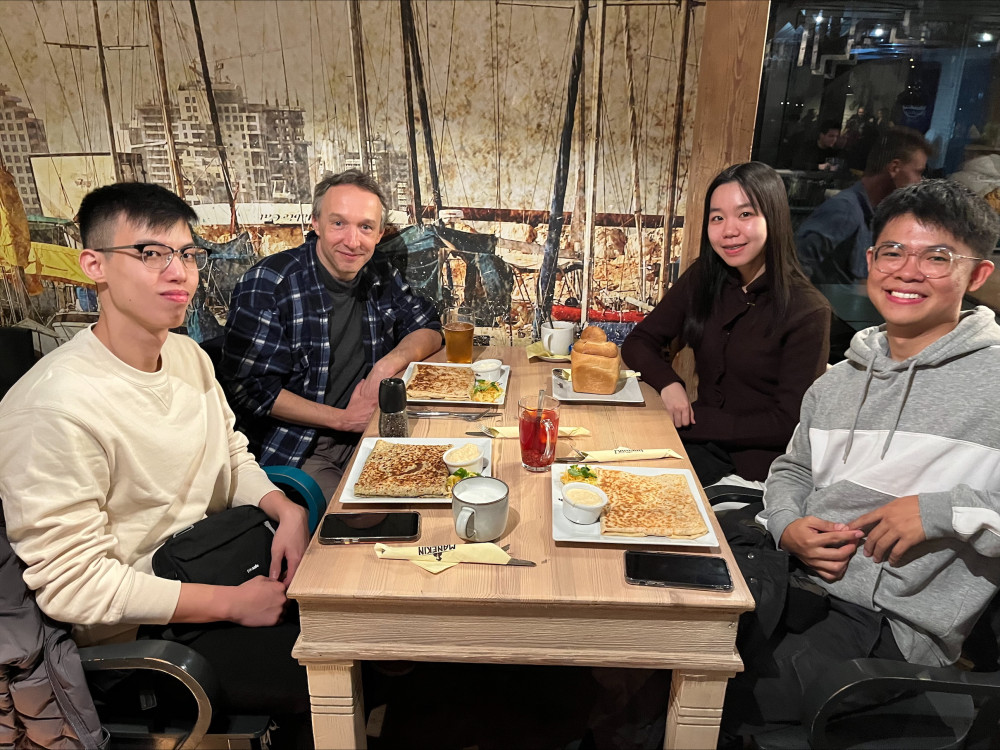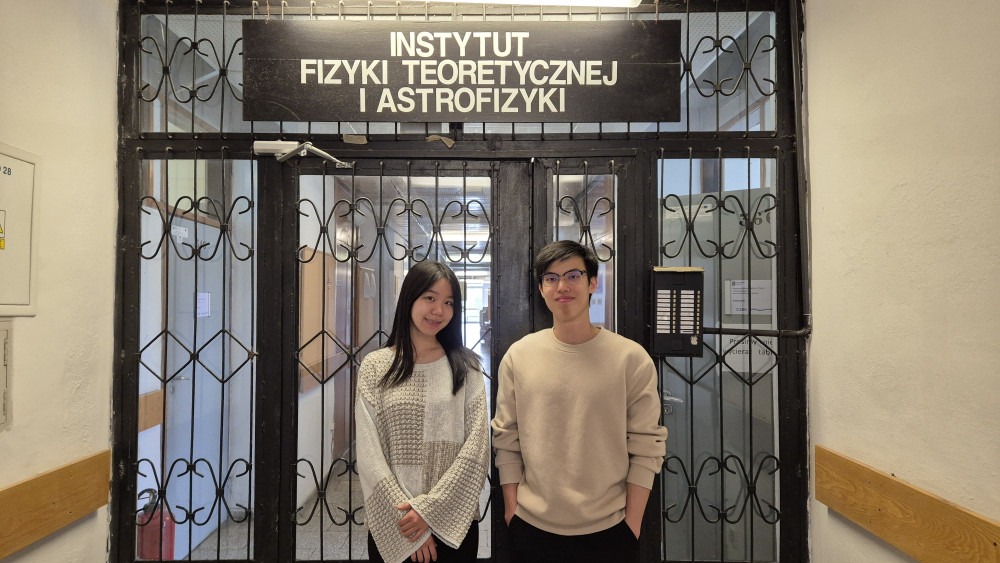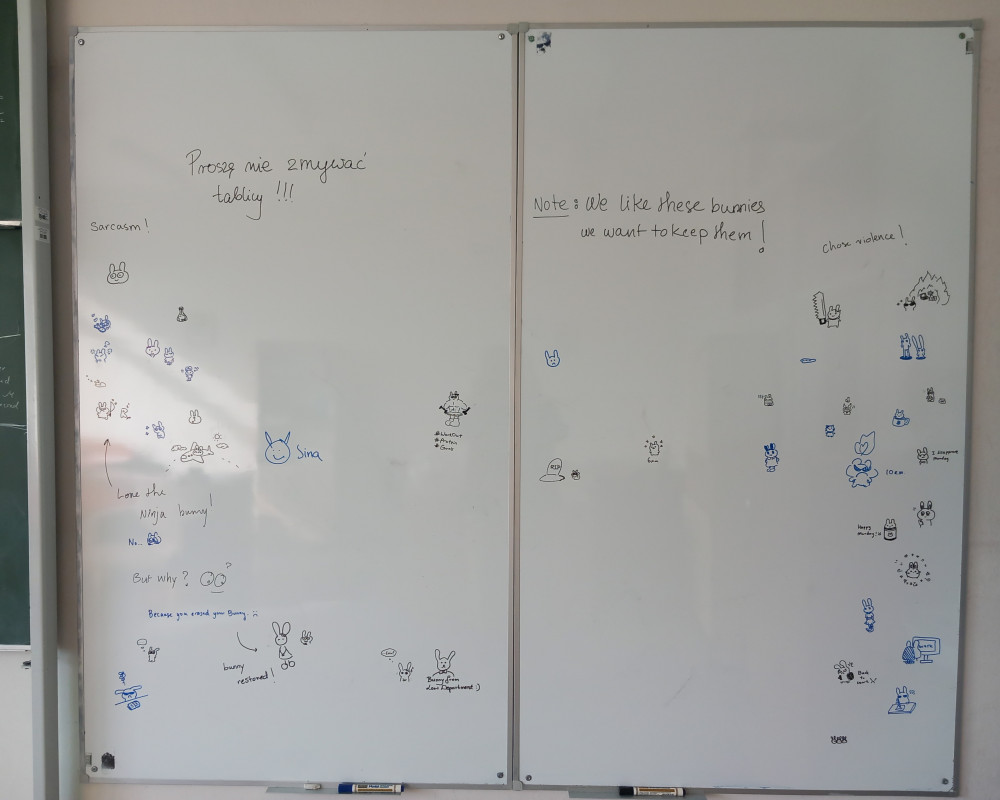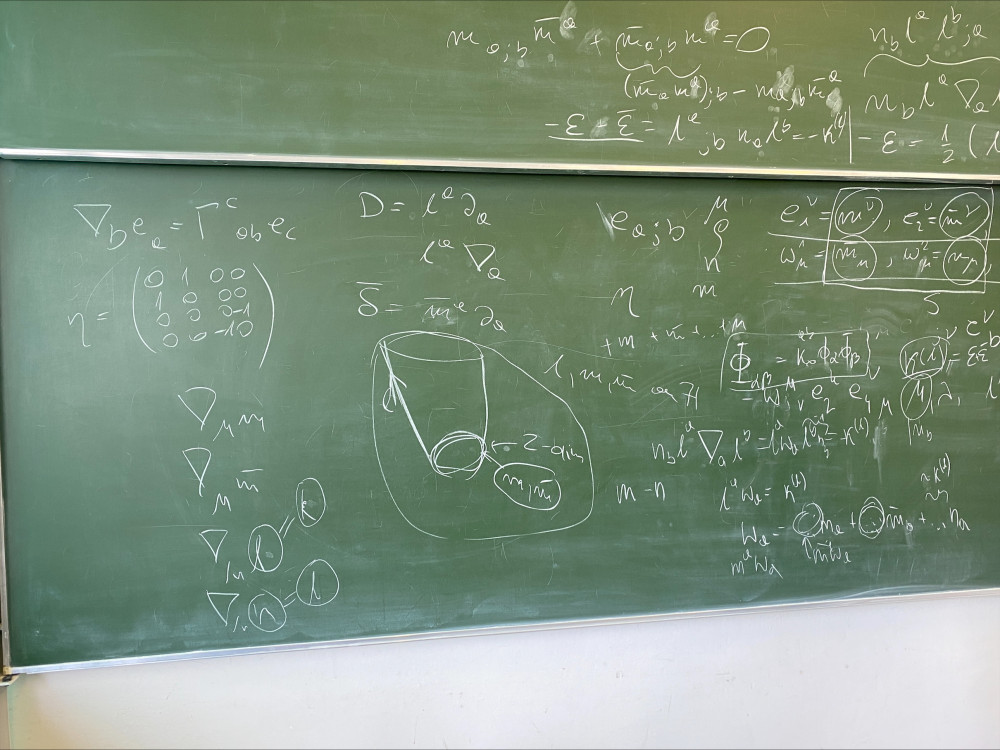Interns from Malaysia at FMPI
One of the goals of the Faculty of Mathematics, Physics and Informatics is international cooperation and supporting the education and scientific development of young, outstanding individuals. An initiative that combines both of these aims is: hosting interns from abroad. In 2025, for the second year in a row, the FMPI welcomed students from Malaysia for an internship.

from the left: Thurston Foo Weng Nerng, prof. dr hab. Tomasz Paterek, Chin Yun Ten, Liew Dek Hao
This time, from March to July, we’re hosting Chin Yun Ten, Thurston Foo Weng Nerng, and Liew Dek Hao from Xiamen University at the FMPI of the University of Gdańsk. The interns from the Institute of Theoretical Physics and Astrophysics agreed to share their experiences at the faculty!
How would you rate your experience at our faculty so far?
Chin Yun Ten: So far, I’ve really enjoyed it. I have a lot of freedom, which allows me to work at my own pace. It might sound unexpected, but this system has made me highly productive and yielded effective results.
Liew Dek Hao: My experience has been simply excellent. We’re working in an environment filled with the most outstanding physics professors at the University of Gdańsk, which makes it very motivating.
Thurston Foo: I can only agree with my colleagues that working at the Institute of Theoretical Physics and Astrophysics has been wonderful so far!
What does a typical workday look like for you?
C.Y.T.: I work with Dr. Thomas Zlosnik. Almost every weekday, I come to the office – which we call the “PhD incubator” – and I start my work based on whatever I feel like doing. I read the literature related to my research, do calculations, work on equations… But most often, I start with a bit of mental preparation [laughs]. If I feel motivated, I return after lunch and keep working even until 7 PM.
L.D.H.: I usually begin by reading texts related to the problems I’m currently working on, and then – with a fresh mind – I try to think of new solutions to those issues. I report all progress to my supervisor, Dr. Denis Dobkowski-Ryłko.
T.F.: I work with Yun Ten. Admittedly, to an outsider, our workday might not sound too exciting, but I actually enjoy it very much. I find comfort in this simplicity… I mean the routine, not the research itself – that’s certainly not simple [laughs]!
L.D.H.: Oh, I agree. After every meeting where we discuss my progress, Dr. Denis always gives me new, difficult problems to solve [laughs].

from the left: Chin Yun Ten, Thurston Foo Weng Nerng
So, within that routine, is there anything you particularly look forward to? I mean specific activities, going places, and so on?
L.D.H.: I can’t wait for more seminars at UG. Listening to brilliant scientists from all over the world is truly exciting! Also, I’ve grown to like the meetings with the Student Council. It’s a great opportunity to meet new people our age and exchange thoughts and experiences.
T.F.: About twice a week, we meet with Dr. Zlosnik to discuss our research topics and progress. We can also drop by his office anytime we have questions. I think that’s what I appreciate the most about my work.
C.Y.T.: For me, that opportunity for dialogue is also very important. Not just with Thurston, who literally sits next to me, but also with other PhD students, like Mehraveh. And I’ve made it my mission to cover Room 366 with bunnies! The whole office board is filled with them [laughs]. There are even notes asking not to erase them, both in Polish and English, written by Gosia and Mehraveh respectively. I hope they stay there for at least another semester.
So, judging by your answers so far, would you also say that you’re happy with the overall work environment? I mean the organizational side, the general atmosphere, other staff members...?
T.F.: I can confidently say that I’m very happy with that aspect. Both the staff and students are extremely friendly, and my supervisor has vast knowledge that he willingly shares with us. The environment for learning and research is very supportive. I haven’t experienced anything that would spoil my mood even a little.
C.Y.T.: Yes, I really appreciate my work environment – it’s positive, motivating, and supportive. Great people; great atmosphere!
T.F.: There’s a sort of refreshing and warm aura that just hangs in the air at this faculty…
L.D.H.: Yes, but also a kind of old-fashioned vibe – in the best sense of the word! The office and the institute look exactly how I imagine a physicist’s workplace should. The building has a rather vintage look, which makes me feel like I’m part of the history. It gives me a sense of mission [laughs]. The administrative staff are very helpful, especially Ms. Gosia from the Dean’s Office, who is always there to assist us. And my supervisor keeps mentoring and guiding me in my scientific work.
C.Y.T.: Personally, I’ve been lucky to always meet amazing people in the physics community. That’s been true in Gdańsk as well.
L.D.H.: This is my first research experience abroad, so at first, I was a bit stressed due to cultural differences. That fear disappeared shortly after I met Dr. Dobkowski-Ryłko, who turned out to be a very open and kind person.

the bunny board in room 366
During this internship, have you achieved something you’re especially proud of?
L.D.H.: I’m most proud of solving a very long equation I’d been working on for five days! The main challenges I face are research-related. The solutions aren’t always correct or complete. Hard work doesn’t always bring immediate results, but what I consider an achievement is that I’m always making progress. Especially thanks to the support from others.
C.Y.T.: The challenges I face aren’t unique – sometimes I just get stuck and have no idea what to do next. I think everyone goes through that. Scientific research is difficult, that’s for sure, it happens. You can’t just give up – you have to keep working and figure it out somehow! I know my achievements so far aren’t exceptional, but I’m still proud of them. And I’m continuing down this “physics” path, looking to the future with hope.
It’s nice to hear that you’ve had a positive experience with FMPI, UG, and the city itself. Was there anything that surprised you upon arriving in Poland? Dek Hao mentioned cultural differences.
L.D.H.: As a Malaysian, I was probably most surprised by the weather – compared to my country, it’s very cold here. But that didn’t discourage me, quite the opposite! I’ve lived my whole life in a hot climate, so I immediately fell in love with Poland. The spring chill, the humidity, and the gentle breeze are, surprisingly, very pleasant for me.
T.F.: Speaking of the weather, I have to say that spring in Poland is wonderful. Watching the flowers bloom is a real feast for the eyes. I really like the weather, and walking through the city and its many parks brings me a lot of joy!
C.Y.T.: I agree – I’m genuinely happy to be in Poland. It’s a beautiful country and, in my opinion, simply a great place to live. This was the first time I experienced the arrival of spring: the cooler air and the sight of blooming flowers were something completely new and refreshing for me.
L.D.H.: Another surprise for me was how clean everything is. Toilets, streets… Everything seems so orderly! The public transport system is also well-organized; it makes it easy and convenient to explore the city.
C.Y.T.: Something that surprised me, for example, is that cars stop when you want to cross the road [laughs]. I still can’t get used to it and usually do this funny, awkward little jog. Oh, and those huge flush buttons in the toilets – including the ones we have at the faculty. It might sound strange, but I actually find them adorable [laughs].

calculations made by Dr. Dobkowski-Ryłko
So, one last question: if given the chance, would you participate in a similar internship or project in the future?
C.Y.T.: I had been waiting for this internship program for a long time because I wanted to see what it’s like to do research without having to juggle it with other responsibilities. And to do it in a new environment, with new people. I think it turned out exactly as I imagined – and most importantly, I’m truly passionate about my topic and don’t see it as just another course. If I had the chance, I would definitely take part in something like this again. And I’m putting a return visit to Poland on my dream list!
L.D.H.: Yes, one hundred percent, if I ever get the chance. Studying physics in Europe has always been my dream. After coming here, I’m even more certain this is what I want.
T.F.: Me too, without hesitation. If I had the opportunity to participate in something like this again in the future, I’d definitely take it.
L.D.H.: I think we can thank Professor Tomasz Paterek for making all of this possible. And finally, I’ll say something in Polish that I’ve learned: “Dziękuję, Polsko. Kocham Uniwersytet Gdański!”
Thank you all for the interview.




